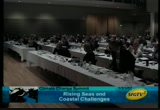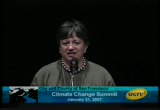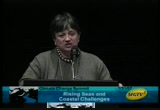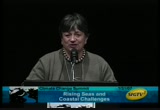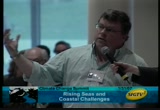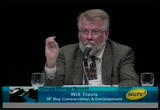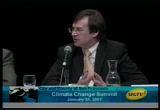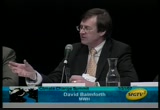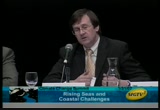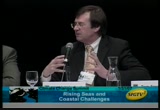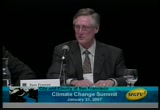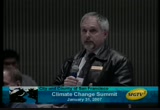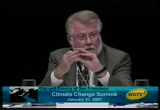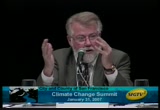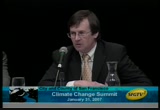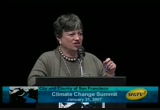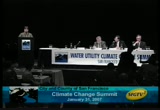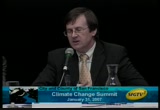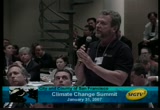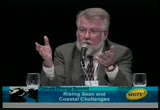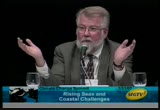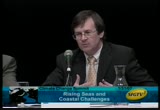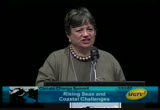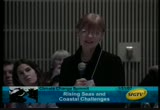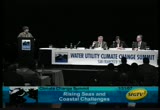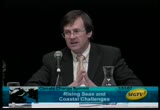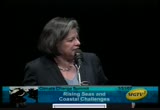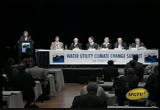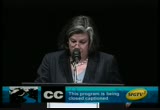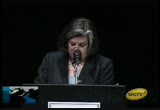tv [untitled] September 8, 2010 12:30am-1:00am PST
1:30 am
we'll proceed with a discussion period. . >> okay, i'm going to come back up so just so i can spot people in the audience. i understand there are staff with cordless mikes around available to come to your seat if you want to speak. i'd just like to start the discussion off with a couple of points. first of all, you know, we went pretty quickly from optimism and high level of discussion about measures that could be taken to change things and i work for a mayor who is an optimist and i just love it. i love it when he announces stuff like this because it gives us the permission to go out and do dramatic things. but then you have to listen to
1:31 am
the people who actually make these systems work and talk to them about what it costs and what they are going to be facing. i think one of the more important points that may have gotten -- may have slid past you that both will and david made was -- and really needs to be thought about is that the investment decisions are going to be made based on protecting the highest value properties. this is why the issue of global warming and sea level rise has been seen as an environmental justice issue internationally and nationally from the very beginning by some people who are thinking about the social implications of all of this as well. because we're not just talking about some abstract way of assigning dollars to a particular geographic area, we're talking about neighborhoods and people that will be sacrificed or at least not receive the same level of
1:32 am
attention as others will. and in the urban areas where we tend to have the greatest extremes of wealth and poverty and of neighborhoods that are -- facilities that are absolutely -- that absolutely must be protected at all costs versus areas that are more marginal, this is going to become a very contentious area for debate at the political level. similarly, when we talk about the amounts of money that are going to be invested don't sound maybe that huge right now, but an on-going and going forward basis they are gigantic investments that we are talking about and those are not necessarily the glamorous investments to be making. they are not the ribbon-cutting projects that people like to get their pictures taken in front of, but at the same time the people who are the political appointees -- i think we've seen that in other places who are standing there at the
1:33 am
time that the polluted flood waters are rising are not going to be -- are going to be the ones who are going to be viewed as having been the villains even if they weren't there 20 or 30 years ago when the decisions were being made about what to protect and how to do it. we face some really tough decisions that have to be made right now and the people in this room are, many of them, the people who are going to be making them or at least informing the people who are going to be making them. i know i am preaching to the choir right now but i would welcome your thoughts and comments right now. >> hi, mary, greg slotnik, clear water water district. i was struck by the program today and this is something we struggle with all the time, who is not here in the choir. there's no one here from land use jurisdiction, the people who make these decisions.
1:34 am
we will engineer our way out as best we can and how do we deal with that issue and break through to those decision makers when they are focused on economic development rather than how do you stop causing a problem that we are all going to have to fix? will's comments about river flows, we have it in south bay, how are we going to deal with the fact that sea level rise is going to create katrinas all over the country and that's in terms of rivers not having anywhere to go. >> thanks. will, you want to start with that? . >> thanks, greg. as greg knows, we have been working very hard to bring the water agencies, the land use planning agencies and the environmental community, the business community together. our problem is that we have 24 hour days when we need about 106 hour days to do all that. but i think you are absolutely
1:35 am
right and mary's point about the political difficulty of making some of these decisions, and we're seeing this in new orleans, the first reaction is put it all back together the way it was before. if you're not willing to do that, you're a racist. and we have to acknowledge that the status quo is a very conscious decision with very high costs associated with it. some benefits, but we need to factor that in. i think it is extraordinarily difficult politically to get out in front on that issue and get re-elected. ironically, i think who will save us -- i always like to say there is no morality in the bottom line and probably the most amoral institution is the
1:36 am
insurance agencies. i think they are going to look at their money and say we are not going to put our money into areas that are susceptible to flooding over and over again. if you can't get the insurance, you can't get the funding and you can't build it. >> david? . >> firstly, the last impression i would want to give is that we have it all sorted. we are struggling with exactly this issue, to get all the stake holders around let alone agree to any sort of uniform action or plan. the way we are trying to address this is to try some pilot projects because the major -- to try to do it over a
1:37 am
whole area is just too difficult. but if you try to do it for a particular part of an area, you do have to do it by persuasion and you have to do it by push as well. so i guess the mayor -- i don't know your systems as well as i know the systems in the uk, but there does have to be a top down push on this as well quite honestly to get everyone around the table. you get them around the table and say let's look at what if. how would it work if we worked together. particularly if you can bring in examples how it's worked in other areas. it is absolutely fascinating when you do this, you start with people who have very entrenched positions. i'll give you an example. one of the strategies we are looking at in the uk for the more extreme frequent events is to start to design highways as flood channels. interestingly, a lot of the design guidance we are picking
1:38 am
up is from the u.s. so we are picking up your experiences and trying to adapt them to uk applications. our highway engineers said no way, we're never going to do this. the concept of using highways as flood channels is a complete no-no until we started to bring out examples like the glasgow flooding and said for most of this event, the highways acted as flood channels. the interesting thing when you start to look at urban flooding, you start to learn some very important lessons. first is that water flows downhill. secondly, it accumulates in low spots. in the uk, it's very interesting what you find in those low spots. first of all, you find that's where the low income houses, that's where the poor people live, the people who have no say really in what goes on in the community.
1:39 am
so i was really pleased you make the point about environmental justice. the second thing you find out in the uk it's almost always where we put our emergency services because the land is cheap. your fire departments, the ambulances, all that disappears in the first half hour of the storm. >> we use earthquake faults for that. >> okay, but i like the idea of the pilot project because people don't have to commit themselves so much. you get them working on the pilot project and then you expand it. >> certainly san francisco has a problem along these lines as well. we've been looking at developments that -- i guess i preface my statement by saying maybe, echoing the mayor's
1:40 am
comment about we should have started looking at this 10 years ago, 10 years ago, at least in my world, i don't know that we talked much about this kind of thing. so we're seeing developments in san francisco, i've talked to developers that said, gee, tom, if anybody in the city would have told me to build my building two feet higher so it would drain right, i could have done that. it wouldn't have cost that much. it's just getting people together and talking together. we're making a move on that at the present time. it's a hard thing to do. there's lots of different departments with lots of different visions but we've just got to keep pressing on with it. we've been somewhat successful with our planning department and building inspection in at least getting them to the table and making them -- i think they are starting to understand the problem now. we just have to keep pressing on. >> great, great question dave.
1:41 am
>> dave erickson, (inaudible) we're a nonprofit (inaudible) i find it interesting we're dealing with primarily adaptations. we've got a lot of success looking at mitigation, looking at it from the side of what we're going to have to do locally to address the cost of global warming. i wonder if you could address what you see as being a proactive method for addressing solutions to going forward to lowering impacts, incorporating the integrated planning element. >> anybody want to tackle that one? . >> well, i happen to have the good fortune of being in a room
1:42 am
with the executive directors of the metropolitan transportation commission, the association of bay area governments and the bay area management district the morning after governor schwarzenegger signed ab32. mag matic people all. at the end of the day, it doesn't really matter what california does. but to a person they all said, but what this is about is leadership. it is anything you can do, anything step forward on this, anything we can be doing to introduce this problem and solutions into the way we as a society make decisions. because that's what leadership is all about. i think without taking that moral spiritual step, nobody in the world is going to listen to us. i think as we take that step, i am so fortunate in being here
1:43 am
in the bay area with some of the most innovative, bright people who come up with wonderful solutions, i think we're going to be in a position of leading the world and really making a hell of a lot of money at it. so the short and cop out answer is, i think anything we can be doing to inject this decision at every point in our local political process, our planning process, our governmental process, at using our leadership, i think that's the most important thing we can do. >> great question. and a great answer from will, actually. i don't really have much to add except perhaps to reflect on my previous answer and i think this is not a pilot project. i think as an engineer it's -- it should not be easy to forget, although sometimes i think we do, that everything we do has that impact in terms of climate change and it isn't
1:44 am
just the energy that's consumed through extra pumping, it's the embedded energy, it's the embedded carbon emissions that's into everything we build. the more we build, the more concrete we cast, the greater the impact we have on the environment. in my view, and my company's belief generally, it isn't just looking at the flagship's schemes that can demonstrate improvements in terms of environmental impact, it's embedding that into every scheme you do, every single bit of development, integrated solutions, engineering design whether it's a big scheme, a flagship project or it's just a small scheme looking at local improvements. every single thing you do, you have to embed this change of thinking into it. . >> just adding on a little item, one thing we're looking at in our master planning effort is what we call low impact development. it's the unconcreting over.
1:45 am
city, basically, is one way i think about it. what that does for you is hopefully reduce the amount of water you actually have to handle by pumping and treatment and so on. it just has to be a fundamental component of everything you do. >> i'd just like to maybe add from the chair's perspective here that what we're seeing in los angeles i think is that adding climate to the mix so that it's not just another box that you check off, but something that actually causes you to think differently about whatever the project or the problem is that's in front of you sometimes causes you to break out of the paradigms that you have been in and to actually start addressing problems in a more holistic way. and if that's the case then there is at least a small silver lining to this very dark cloud, that it will force us to do things that wise people have been suggesting we should do for a long time in terms of
1:46 am
better planning. . >> (inaudible) integrated response scenario and in all cases the local response scenario had lower impacts. what is the difference between those two scenarios and how it local ownership a better scenario than global sustainability. >> did everybody hear the question? you might just want to repeat it briefly. >> a question about the different scenarios and why -- it was basically a question really about how the different global scenarios lead to different conclusions about what the future looked like, if i can put it like that. it probably would take quite a lot of explanation to deal with all of that and maybe you and i
1:47 am
can talk afterwards in a little bit more detail, but i think what's important to realize when we look at the future scenarios, it's looked at in more than one way. it's looked at both in terms of the economy and the impact on the environment. when you are looking at evaluating different strategies against those future scenarios, you are looking at how those different scenarios not only influence the environment in terms of the number of carbon emissions and the residues that are produced, but also at how much money they are going to have available to invest in adaptation strategies. because both the things are closely interlinked. so it isn't just looking at the impact side, it's looking at their capability of coping with climate change. it's those two aspects that are rolled in together there. perhaps that will help to answer that question a little bit. >> i expect the two of you can talk more afterwards. . >> mary, it seems that defining the problem is going to help
1:48 am
drive what we look at as solutions. in your opening statements you mentioned you have plants at 20 feet and you are looking at projections at 9 to 25 feet. that's a big difference. if we're going to spend half a billion dollars in the next couple years in california for water in the delta and we miss the mark between 3 feet and 25 feet, we're going to be in a world of hurt because that investment is going to look ridiculous if it's just 8 feet of sea level rise. what's the consensus on sea level rise if we're going to be designing solutions, what's the problem? . >> good question. anybody want to respond? . >> well, i think that's the challenge, is how do you plan with all this uncertainty? because if you use the lower projections and you end up spending and enormous amount of money building facilities that
1:49 am
flood, you get fired. and if you use the higher projection and you end up spending tens of billions of dollars more than was really necessary to deal with the problem, you get fired. . >> either way, so what's the problem? . >> and i think this is really the greatest challenge that we are facing, is we are introducing into systems that were set up to do one thing a whole new problem and then laying uncertainty over it. let me give you just a specific example. the agency i am the executive director of was set up it keep san francisco bay from getting smaller and we have done a phenomenal job of it over 40 years. but as we look to the future, the problem is the bay is going to get bigger, which probably means we have to go back and institutionally reengineer the whole agency because it's dealing with a problem of the past, not of the future. i think at an engineering level there are lots of those sorts of things that are going to be
1:50 am
introduced into everything we do and we're going to be giving people challenges and saying we don't know how much, but dammit, you better be right. i don't have an answer for it. i know the scientists work to try to refine those numbers. the next report -- there's one coming out friday and there's another one in another month or so in hopes they will get it more precise. but i think the reality is in our lives we won't know. if we are successful in mitigation we will reduce the size of the problem and if we aren't, it's going to get even worse than we think it is. >> i'd like to add one thing to the conversation. for will, i brought one of my favorite prediction tools, my san francisco crystal ball, so maybe i'll loan it to will to help him try to figure this out a little better. >> that's fantastic. we don't have those in the uk
1:51 am
>> great, that's great. >> i think that's a fantastic question. really, how do we manage the uncertainty of it. i wish i had a fantastic answer, but i'll try. we can't know with any degree of precision what is going to happen in the future. so the way i think we try and approach this is first of all, you have the types of solutions you look at differently, which i think is the point you are just making, is that you have solutions which are more adaptable, the nature of the solution is more adaptable to future change so you can adjust it as you go forward. the second thing is you move forward in increments. you don't try and plan a solution now for what is going to happen in 2080 or 2100. you start to go down the road within the bounds of current certainty and in a direction which takes you -- in the direction of the ultimate goal so you don't have to, as will
1:52 am
said, unpick in 20 years time and re-engineer what we've done over the first 20 years. we have to just be certain enough now to say the next 20 years to make a start now. there's a danger that because we can't see into the future we do nothing now. we have to act now. . >> yeah, and i think the time scale is important as well as the risk versus the expenditure issue. and this is one of the reasons why economists all over the world are also looking at these issues, as well as scientists and engineers because there is at some point i suppose an amount of money which is beyond what is possible to spend or at least what would be reasonable to spend. but since most of us in fact won't be around to be fired from whatever jobs we are currently holding at the time that these predictions really come to pass, we are going to have to make decisions now without really knowing how it's all going to turn out. i've been told that we have
1:53 am
maybe two more minutes. if there's a really quick question, we can deal with it and then we're going to have to get off stage. . >> one of the things that we do is try to bring what little we know about climate change to bear on our capital program, which are very expensive and very driven by trying to stay up with evolving regulations. i'm wondering how as we try to rethink some of these projects we're going to get the regulators to think with us. because much of what we do we're doing on a very tight timetable to come into compliance. >> very good question. how do educate regulators. regulators, does anybody have an answer to that one? . >> well, as a regulator i will admit that we are aware of the problem and we are looking for innovative solutions. actually, that question was one of the dumbest questions i've
1:54 am
ever heard and i'm going to have my driver answer it. >> i think the regulators, in my experience at least, are becoming aware that the single purpose deadlines that drive them are not always going to be supportive of the issues we are raising. while they may not know the answers at least they are open to talking about it. >> i think the key thing is our regulations are created in reaction to a problem of the past. the most difficult thing will be to get we, the regulators, and everybody else to turn around and look to the future. >> that's going to take getting back to the political process because these regulators are not driven by their own imaginations, they are usually implementing statutes and responding to very important public imperatives. >> the general part of the
1:55 am
answer is to get everybody around the table and have an integrated approach. and recognize that a lot of groundwork has to be done in facilitating that, in resolving the inherent conflicts because we're not used to sitting around the table with regulators, necessarily, and reaching a consensus on how to go forward. it's not the traditional way of working in many areas. secondly i think to recognize is what drives the regulators. the regulators work for an agency and are usually accountable to the public for a public process. their concern is if they don't invoke certain regulations they will be liable, they will be answerable to the public, and we have to help them with that issue. we have to help them see this is a two-way process. >> i am being dragged off stage
1:56 am
-- is there time for one last point? no. we are due to take a break and be back at 11.30. no, i am wrong. let's hear from our leader, then. . >> i don't know about you, but i believe this has been a great panel, so please show them your appreciation. thank you all for your questions and, mary, thank you for you and your group here to give us some good thoughts and ideas. you are to be back at a little before 11.15 because we want you in your seats at 11.15. so take a quick break. there's more muffins, coffee, juice ....
1:57 am
okay let's get going on our next panel the title of our next panel is mountains to mouths the vanishing snow pact. i have to tell you some of my coleagues at the, puc, did not like that title and if any of you don't you can blame me. i like it. there you go. i think it says a lot and eventhough i have a joking tone in my voice, it is serious business about the vanishing snow pact.
1:58 am
today we have a very distinguished panel and to lead that off is our moderator ja rod, and he represents the area north of san francisco and in his first term he's chairing the environmental safety and toxic materials jurisdiction committee. it has jurisdiction of airport pollution making him the key legislature in over seeing california new global warming law assembly bill 32. mr.,huf fman, serves on the water parks and wild life committee and in that roll will present any water challenges confronting the state this year in that very capacity.
1:59 am
prior to this election in the california capacity he served as senior attorney as the national environmental defense county and was a member of the,m oren municipal water protection district for years. he was instrumental in negotiating the, san jaquin, refr river. we think this will be one of biggest restorations in our nation. please welcome me el
43 Views
IN COLLECTIONS
SFGTV2: San Francisco Government Television Television Archive
Television Archive  Television Archive News Search Service
Television Archive News Search Service 
Uploaded by TV Archive on

 Live Music Archive
Live Music Archive Librivox Free Audio
Librivox Free Audio Metropolitan Museum
Metropolitan Museum Cleveland Museum of Art
Cleveland Museum of Art Internet Arcade
Internet Arcade Console Living Room
Console Living Room Books to Borrow
Books to Borrow Open Library
Open Library TV News
TV News Understanding 9/11
Understanding 9/11